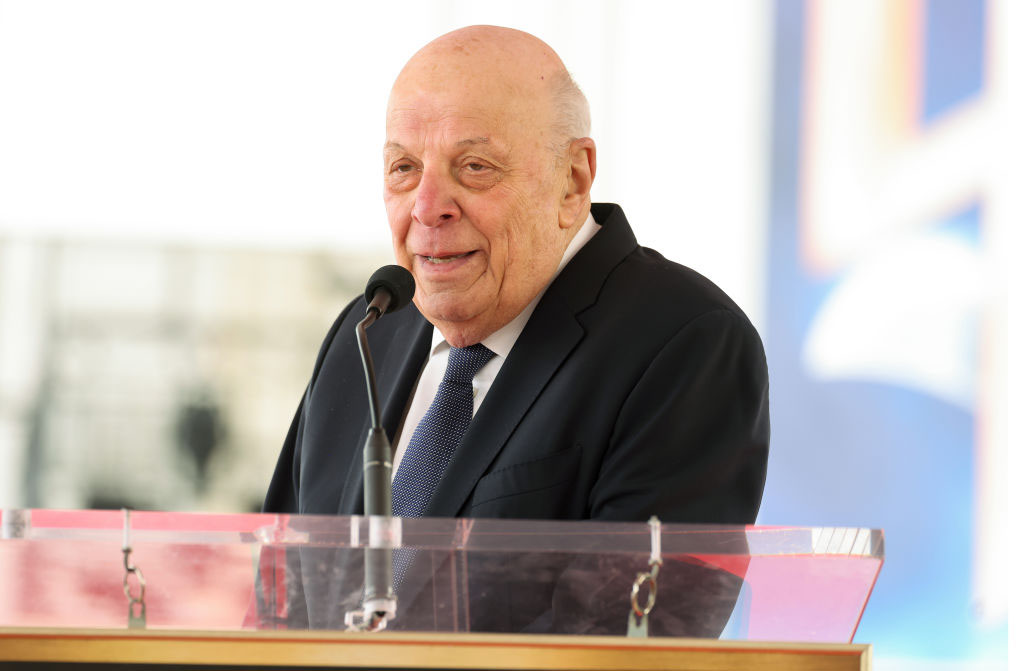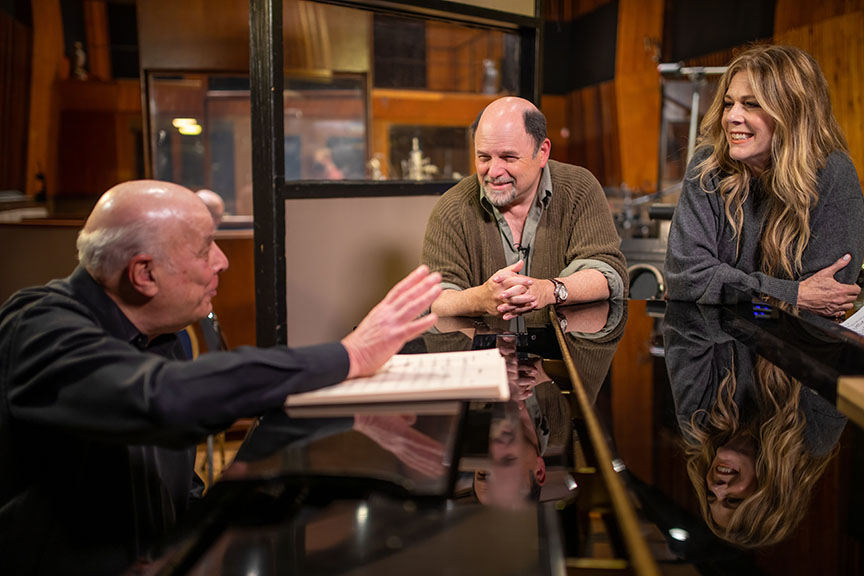 Charles Fox speaks during the ceremony honoring him with a star on the Hollywood Walk of Fame on April 05, 2024 in Hollywood, California. (Photo by Amy Sussman/Getty Images)
Charles Fox speaks during the ceremony honoring him with a star on the Hollywood Walk of Fame on April 05, 2024 in Hollywood, California. (Photo by Amy Sussman/Getty Images) Did you know that the theme songs to television “Happy Days,” “Laverne & Shirley,” and “The Love Boat” were all written by the same person? He’s also the same person who composed Roberta Flack’s chart-topping 1971 hit, “Killing Me Softly With His Song.” The man behind the music is Charles Fox, and there’s a new documentary about his musical journey, fittingly titled, “Killing Me Softly with His Songs” — plural.
The documentary is a fascinating history on cinematic and television music. It also shows just how much power there is in choosing the right music to compliment a film or TV show. The Journal spoke with Fox about the documentary and his career, and it’s clear that he relishes the thought of knowing how much his music has impacted generations of listeners.
“People remember where they were and how they were, and growing up and sitting around the TV, and I’ve had lots of letters from people over the years, I don’t know how to get my number, I haven’t figured out, but I do get a lot of letters, which I can’t take offense to because they’re usually very nice,” Fox told the Journal.
One of the themes that carries throughout the documentary is the importance of mentorship. This documentary will serve as great fodder for older generations to regal stories of an era when television and film were unifying experiences (unlike today, with an endless stream of content and less often a communal watching experience). .
In the documentary, Fox traveled to Paris, where he spoke in-depth about the profound impact his teacher, the legendary Nadia Boulanger, had on his music. Boulanger was a highly respected composer and educator (Aaron Copland, Philip Glass and Quincy Jones all studied with her). Describing his time studying with Boulanger in Paris as a young man, Fox became visibly emotional.
“I was deeply moved,” Fox said. “I was holding back tears actually. Maybe because of this feeling that she gave to me that remained with me, the whole life just came over me like a warm cloud.”
Boulanger was 72 years old when then-18-year-old Charles went to Paris for a summer to study at her conservatory. He would return three years later.
“The love that she gave me, the music that she gave me, the ability to understand music and what the essence of music is and to look under the skin and to portray what it becomes,” Fox said. “The truth of music — not just the collection of notes and chords and harmonies and counterpoint and orchestration — that’s all the end result, but the underlying meaning of it, when you put those things together to become a whole, it becomes the truth. And that’s something that most people wouldn’t be taught or think about, but it’s something that has affected my whole life.”
“The truth of music — not just the collection of notes and chords and harmonies and counterpoint and orchestration — that’s all the end result, but the underlying meaning of it, when you put those things together to become a whole, it becomes the truth.”
As evidenced by the array of testimonials from Hollywood superstars in the documentary, Fox’s music touched many of the most revered talents in film, television and music: Jason Alexander, The Barenaked Ladies, Common, A.J. Croce, Anne Sila, Diane Warren, Paul Williams, Rita Wilson and Henry Winkler.

The documentary is more than Fox’s life story, it’s also a concert film. Several times in the documentary, the viewer is treated to a live performance at intimate clubs from Paris to Havana, with Fox playing piano along with a talented crew of bandmates. The documentary, directed by Danny Gold, weaves together so many chapters of Fox’s life and continued influence on music, film and television. Throughout the interview, Fox emphasized the importance of passing on musical knowledge and inspiring the next generation of musicians.
“I like to give everyone the hope and the inspiration that what they feel in their heart that they can do and achieve is achievable,” Fox said about his time teaching music composition at UCLA and his mentorship of young talent. “I’m very proud of them.” Fox is also quite involved with the new Academy Museum of Motion Pictures, and is mighty excited about the upcoming Hollywoodland exhibit, which will showcase “the Jewish founders and the making of a movie capital.” The exhibit opens on May 19, 2024.
The documentary “Killing Me Softly With His Songs” is now available to rent or buy on streaming platforms. After watching the documentary, fans in Los Angeles can see Fox perform songs from the documentary in person this week on Thursday, April 11 at Vibrato Grill Jazz at the top of the Hollywood Hills.
Here are a few quick questions Fox answered in his interview with The Journal. The conversation has been edited for length and clarity:
JEWISH JOURNAL: Do you find yourself over the years telling other music prodigies or just people taking up music to find “their own Nadia”?
CHARLES FOX: I absolutely do. I taught composition and a graduate course for this UCLA for five years, and I would tell my students things that she said to me, and I said, well, it’s exactly as I heard it from Nadia Boulanger. I wrote my memoir about 10 years ago, also called “Killing Me Softly: My Life in Music.” The reason I have a memoir is because we found the letters that I wrote home when I was a student [of Boulanger in Paris] that my mother kept in a shoebox in her apartment in the Bronx under a hidden layer of things that you put in a dresser drawer. When we moved my mother to California, we saw that she had saved all my letters. I wrote about 200 letters. I didn’t write, “I’m having a good time, send money.” Money was very tight in the Bronx with my family, of course. But I wrote about my lessons every day, and I wrote my experiences and I wrote what she said, and I wrote about the music that I heard, the music I was writing, and I was very descriptive writing to my family. They didn’t understand a word of what I was talking about, about music and operas and concertos, but I wrote them and they read them and my mother preserved them.
JJ: Is there a particular film score or album that you consider to be a personal favorite or a modern masterpiece?
CF: One has remained very near and dear to my heart. It was a Ray Charles album that my wife and I recall was our album — “The Genius of Ray Charles.” And we met in 1961 in the Catskill Mountains. I was a musician working with a Latin band. My wife was a counselor, and that’s where we met. We heard that record together. “Am I Blue” is one of the songs, just beautiful. “Alexander’s Ragtime Band” was one of them. Of course, I knew Ray Charles’ music but that became our record.
JJ: Tell us about a particular moment that still blows your mind about your impact on music and cinematic and television history?
CF: The Smithsonian once asked me if I had something that they could keep. If you recall at the beginning of the show “Happy Days,” a record drops on a jukebox, it spins around and it says “Happy Days.” That was before we had a record called “Happy Days.” We had just recorded it, and they made a record just to spin around. And if you pause, you’ll see it says, “‘Happy Days’ Music by Charles Fox, lyrics by Norman Gimbel.” After the series was over, the producers put that in the frame and gave that to me as a gift. That is hanging now at the Smithsonian, next to the Fonzie jacket, in the same room as Dorothy’s slippers, The Muppets and Archie Bunker’s chair.























 More news and opinions than at a Shabbat dinner, right in your inbox.
More news and opinions than at a Shabbat dinner, right in your inbox.